Thomas James Richards, Diaries, Transcript Vol. 2 - Part 8
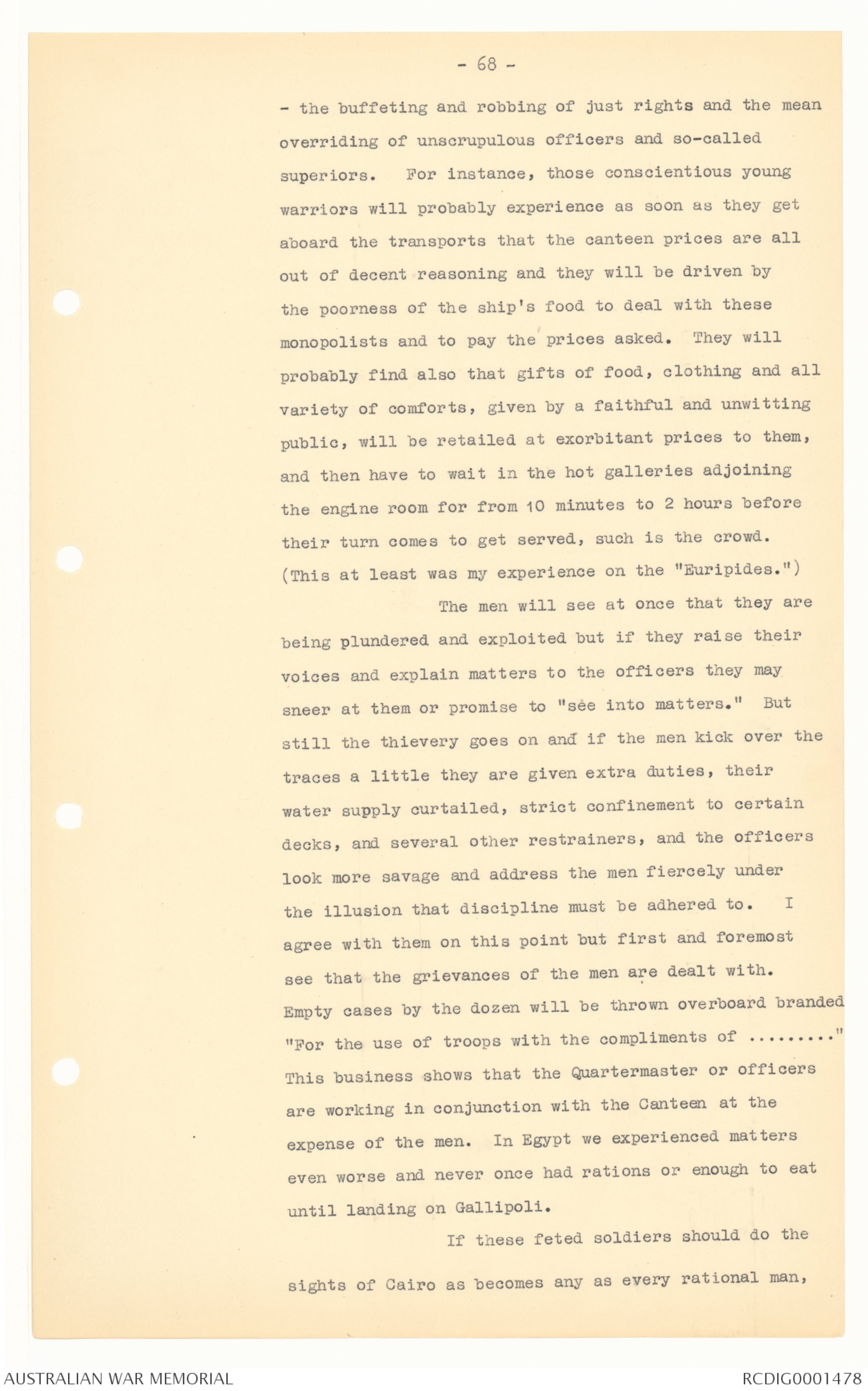
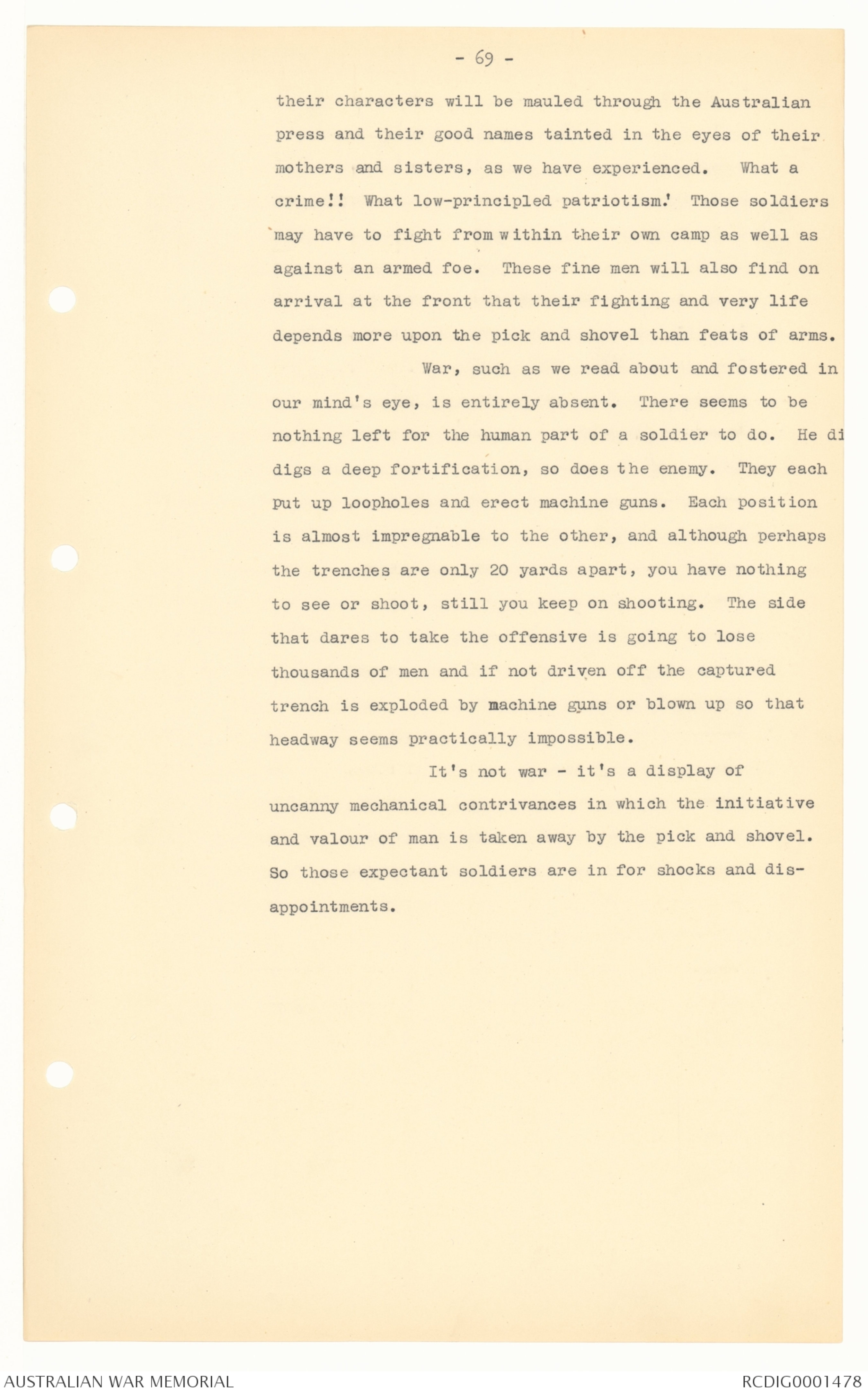
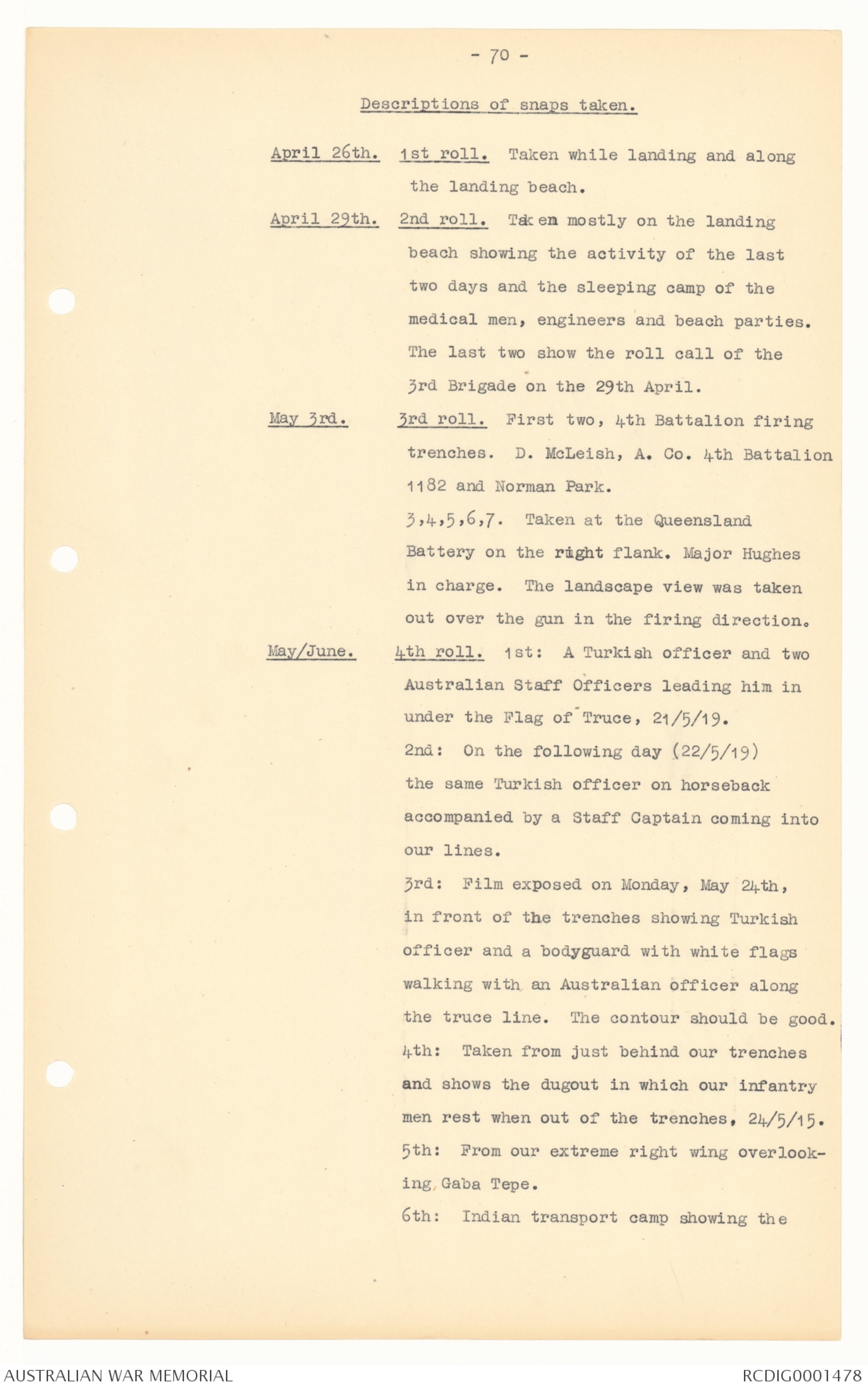
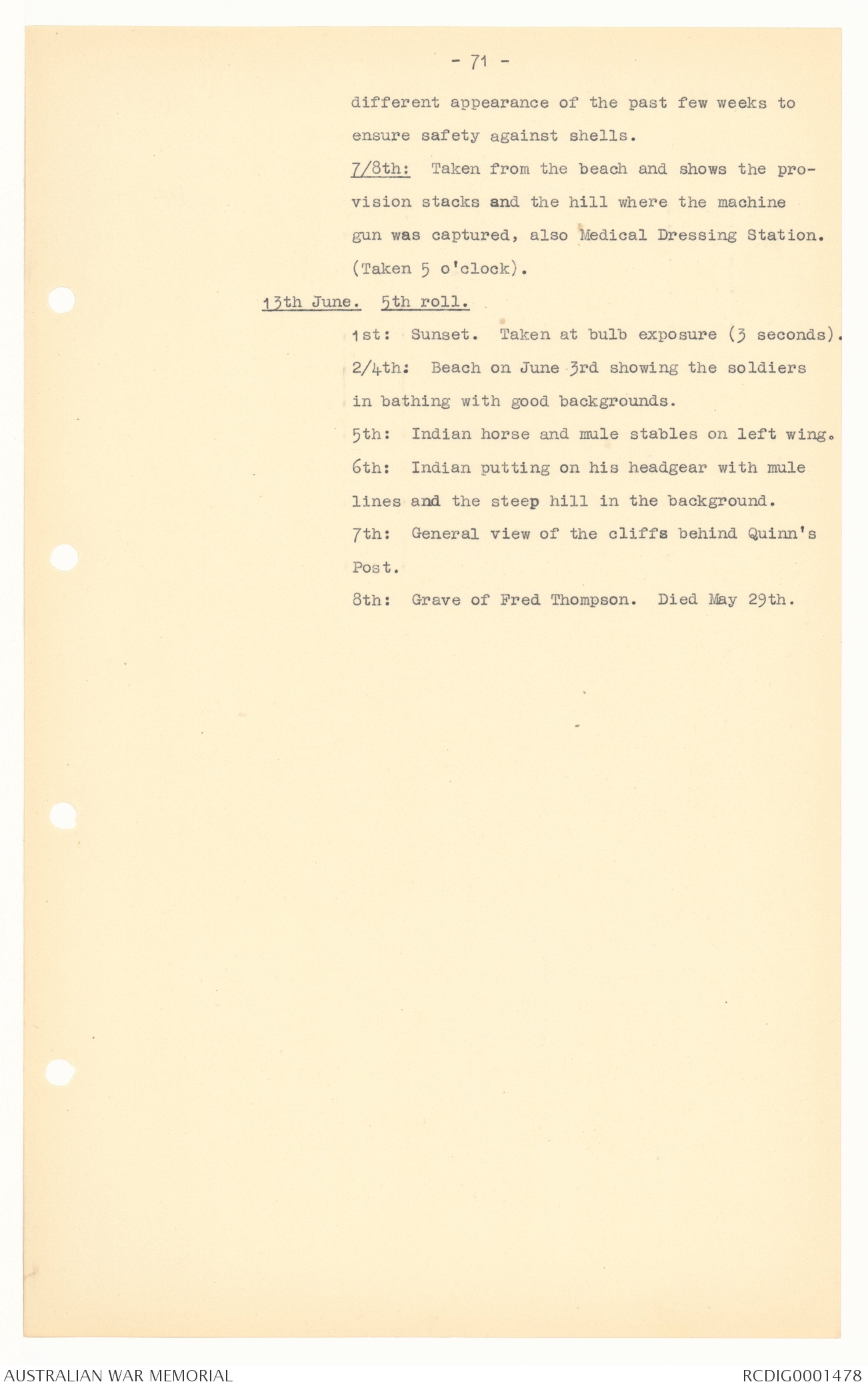
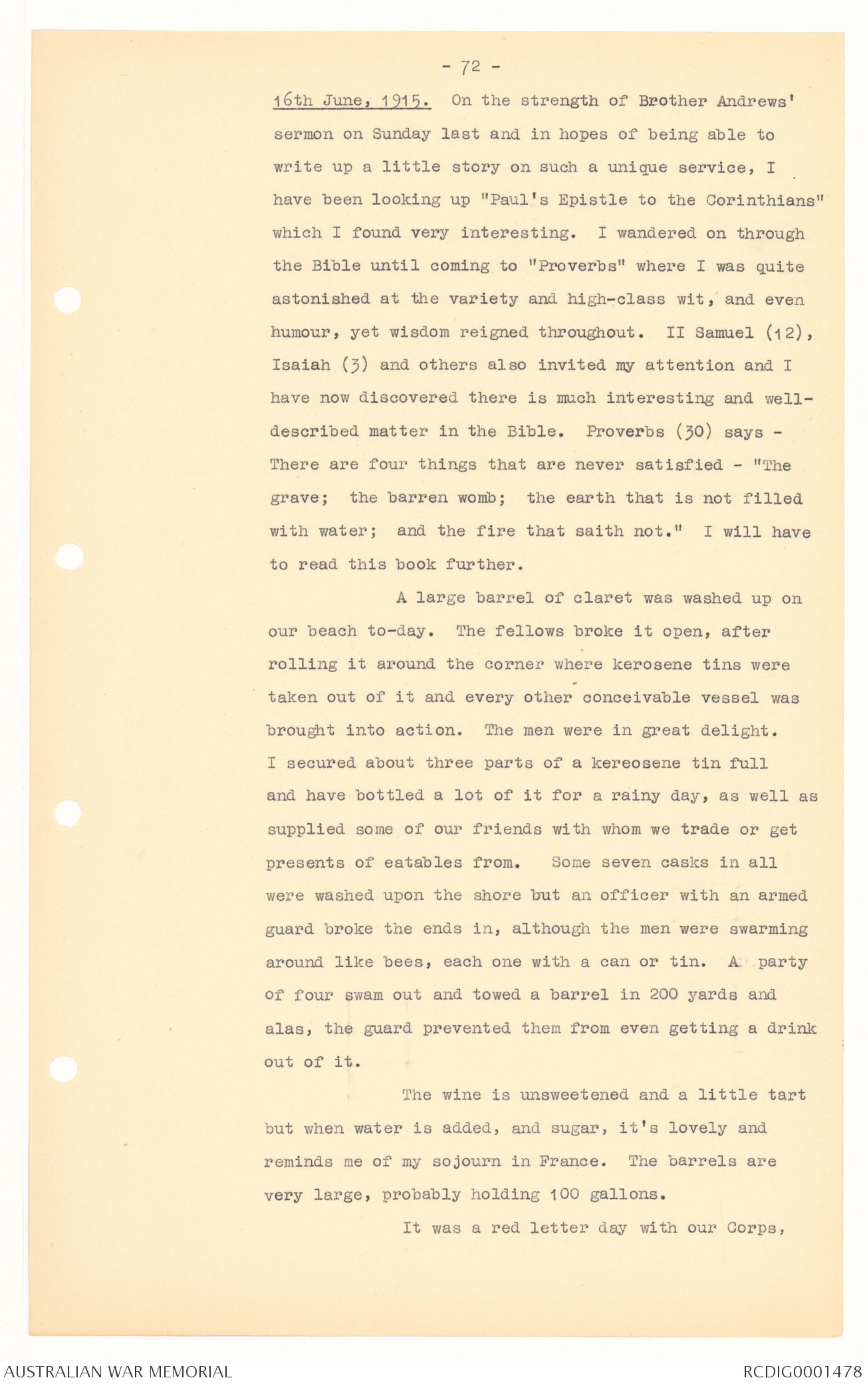
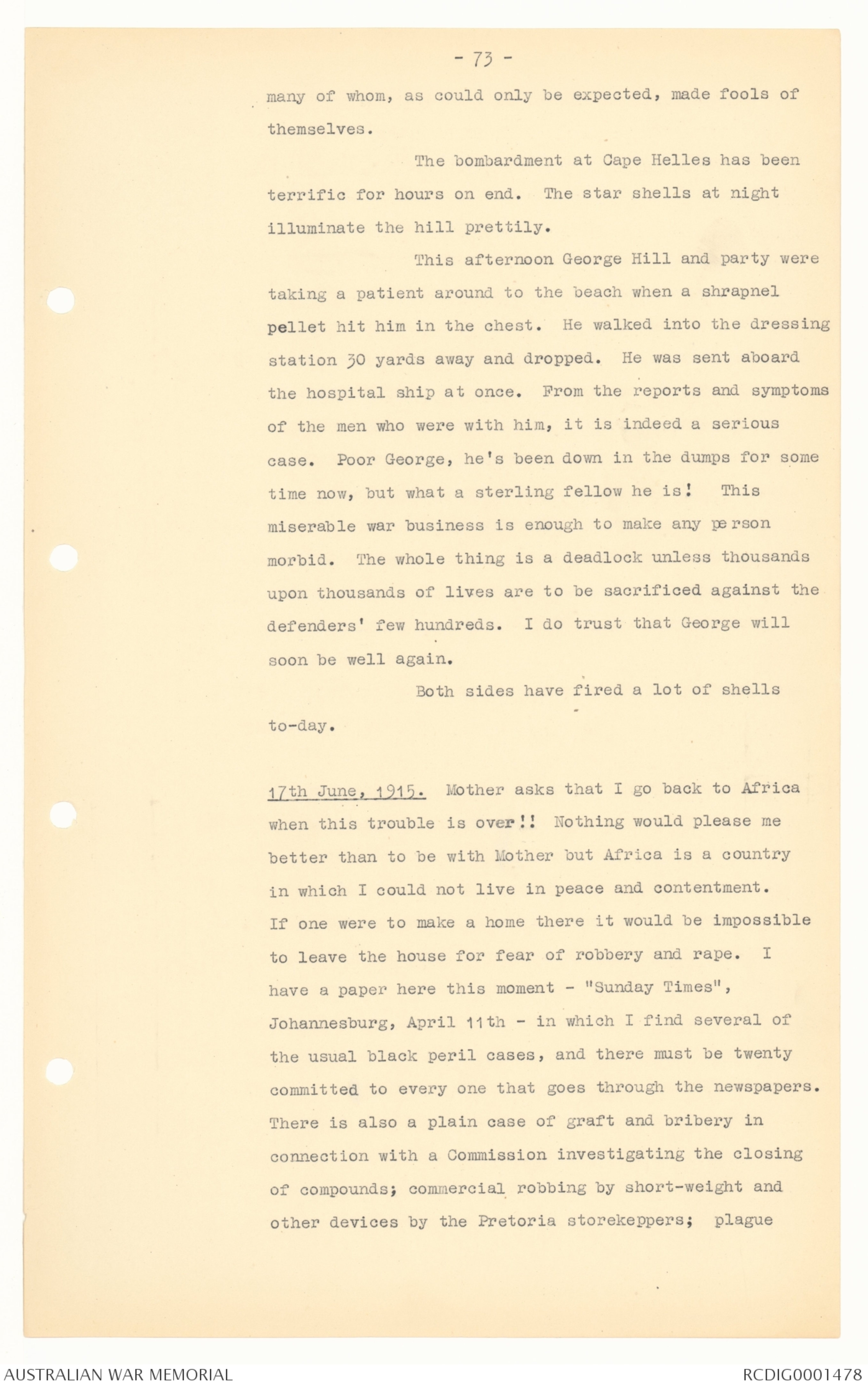
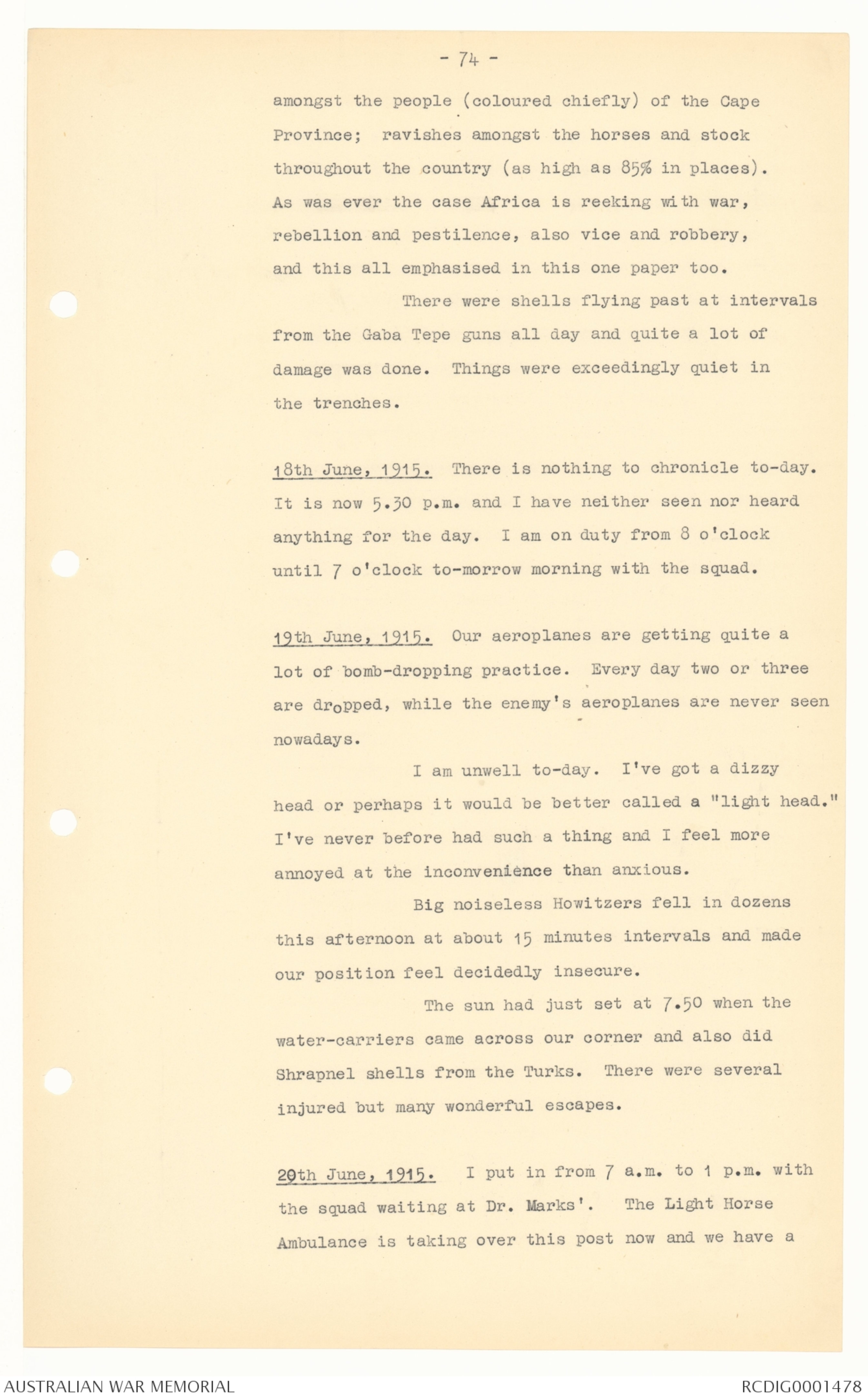
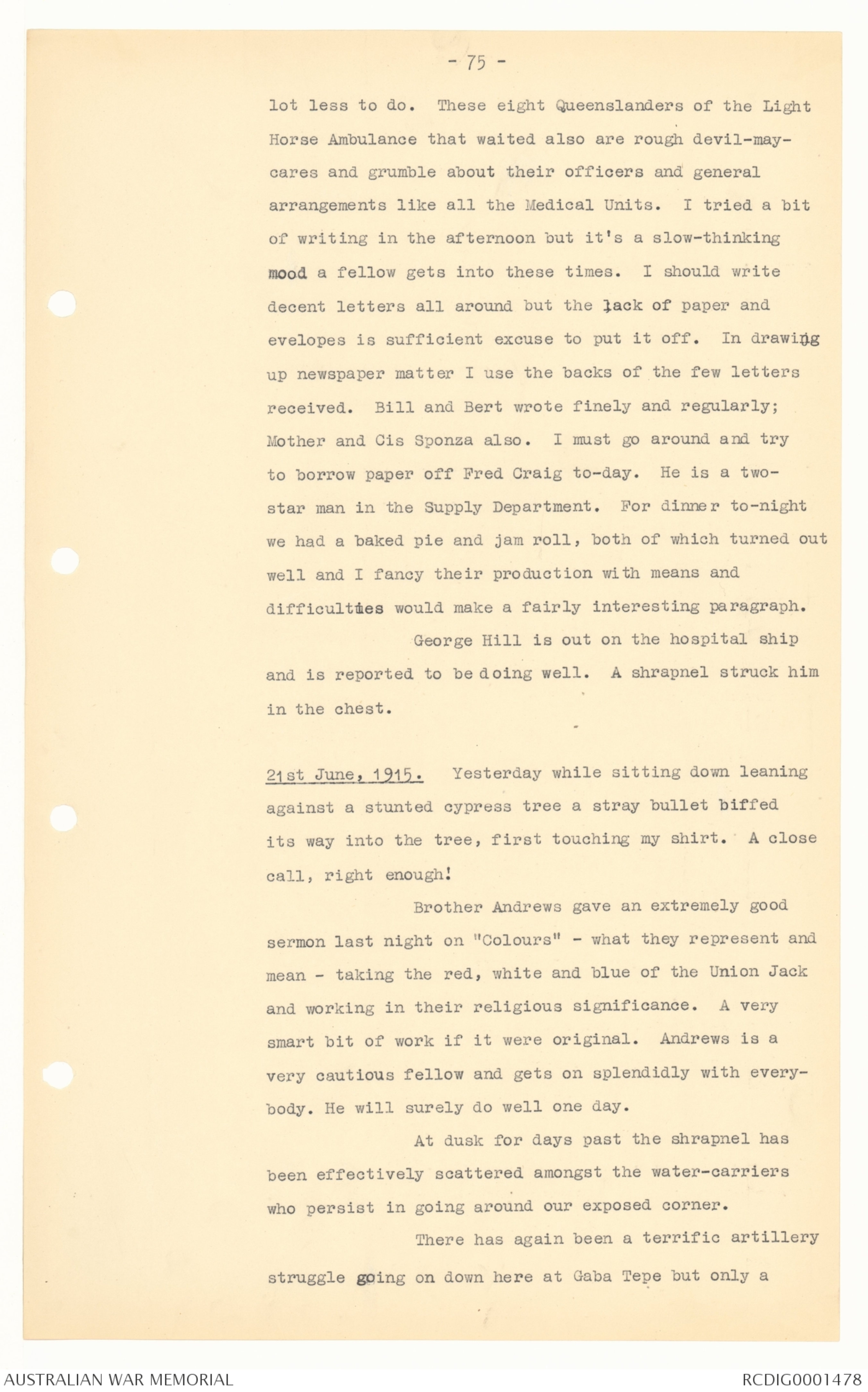
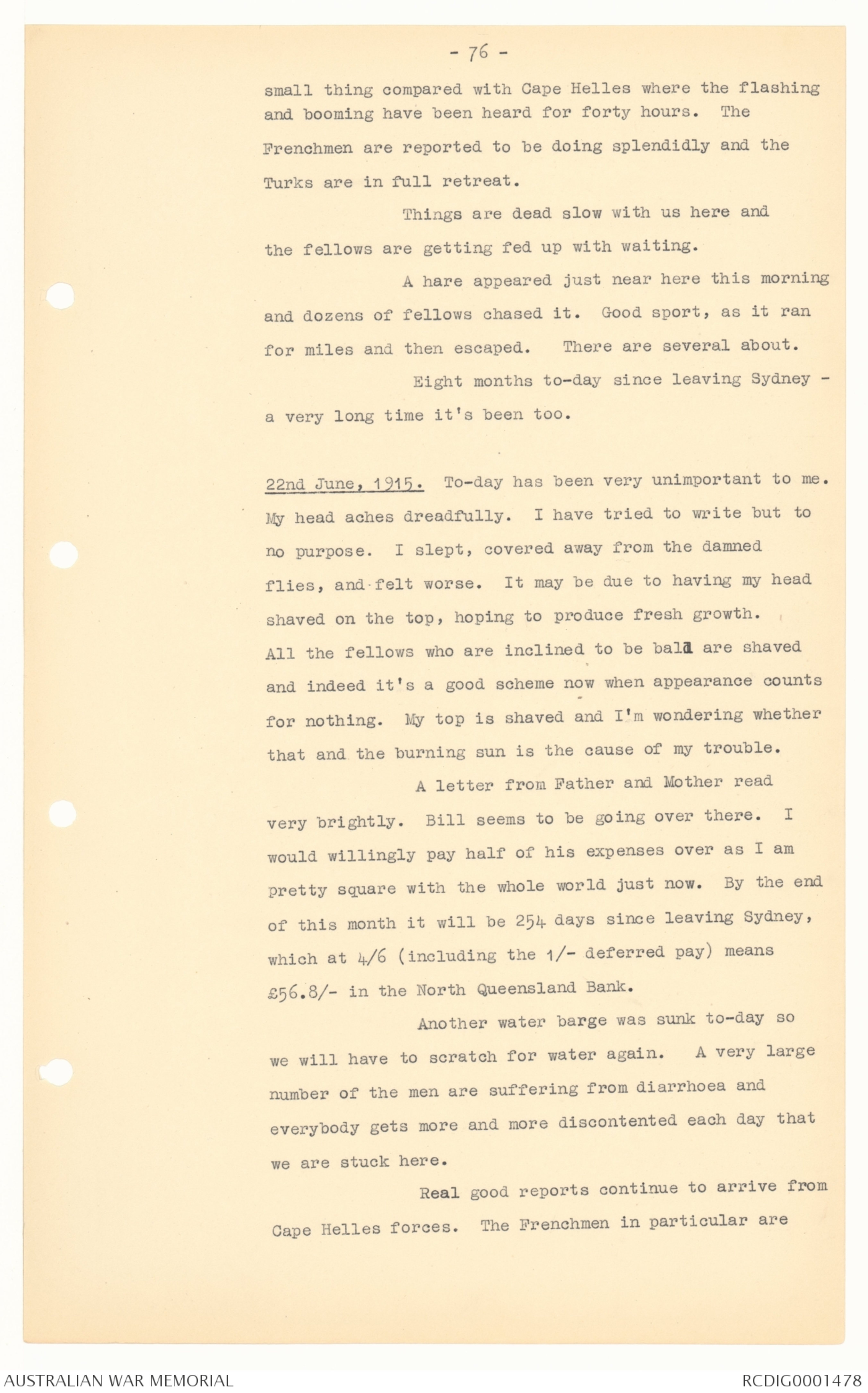
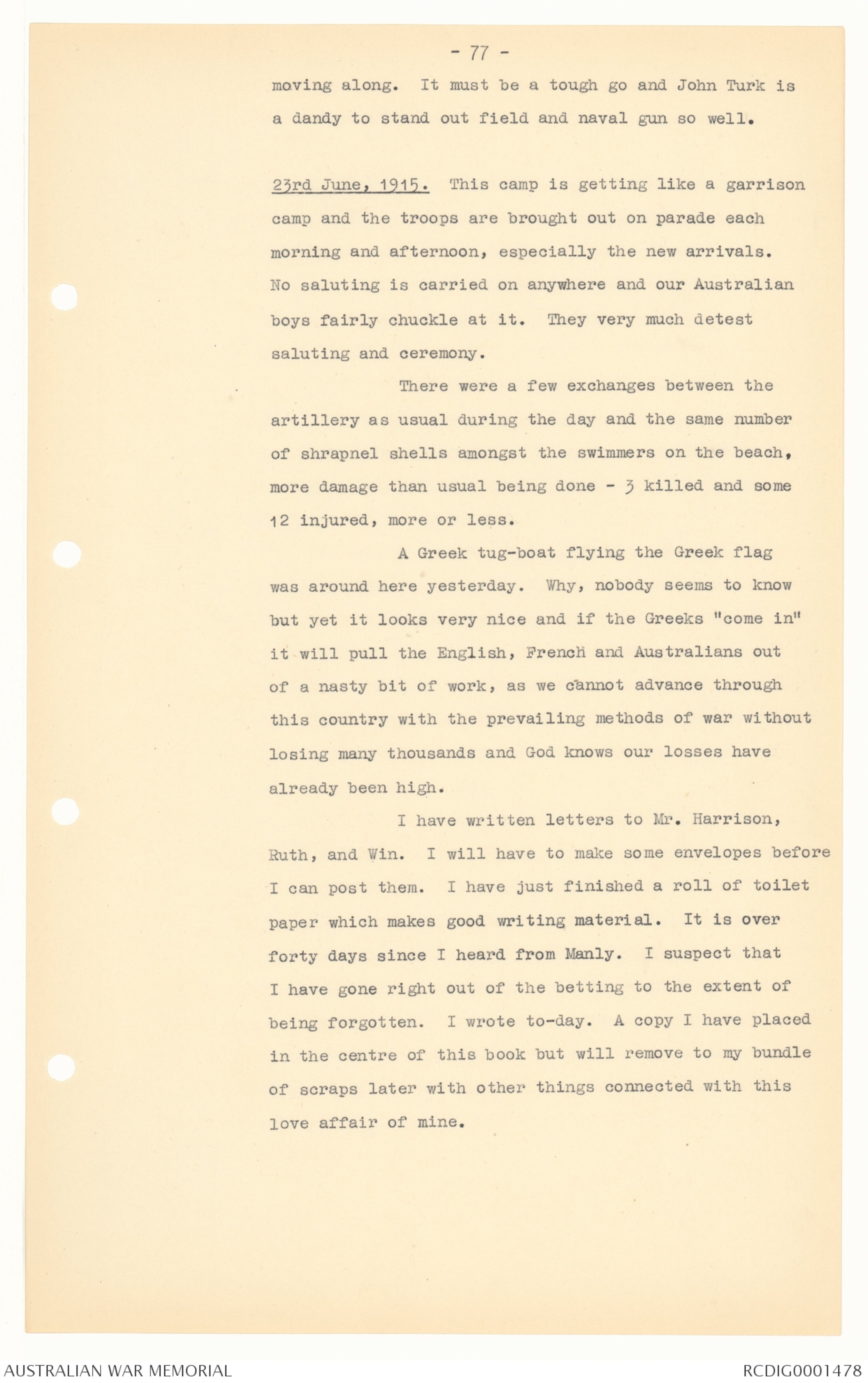
- 68 -
- the buffeting and robbing of just rights and the mean
overriding of unscrupulous officers and so-called
superiors. For instance, those conscientious young
warriors will probably experience as soon as they get
aboard the transports that the canteen prices are all
out of decent reasoning and they will be driven by
the poorness of the ship's food to deal with these
monopolists and to pay the prices asked. They will
probably find also that gifts of food, clothing and all
variety of comforts, given by a faithful and unwitting
public, will be retailed at exorbitant prices to them,
and then have to wait in the hot galleries adjoining
the engine room for from 10 minutes to 2 hours before
their turn comes to get served, such is the crowd.
(This at least was my experience on the "Euripides.")
The men will see at once that they are
being plundered and exploited but if they raise their
voices and explain matters to the officers they may
sneer at them or promise to "see into matters." But
still the thievery goes on and if the men kick over the
traces a little they are given extra duties, their
water supply curtailed, strict confinement to certain
decks, and several other restrainers, and the officers
look more savage and address the men fiercely under
the illusion that discipline must be adhered to. I
agree with them on this point but first and foremost
see that the grievances of the men are dealt with.
Empty cases by the dozen will be thrown overboard branded
"For the use of troops with the compliments of .... . . . .."
This business shows that the Quartermaster or officers
are working in conjunction with the Canteen at the
expense of the men. In Egypt we experienced matters
even worse and never once had rations or enough to eat
until landing on Gallipoli.
If these feted soldiers should do the
sights of Cairo as becomes any as every rational man,
- 69-
their characters will be mauled through the Australian
press and their good names tainted in the eyes of their
mothers and sisters, as we have experienced. What a
crime!! What low-principled patriotism! Those soldiers
may have to fight from within their own camp as well as
against an armed foe. These fine men will also find on
arrival at the front that their fighting and very life
depends more upon the pick and shovel than feats of arms.
War, such as we read about and fostered in
our mind's eye, is entirely absent. There seems to be
nothing left for the human part of a soldier to do. He di
digs a deep fortification, so does the enemy. They each
put up loopholes and erect machine guns. Each position
is almost impregnable to the other, and although perhaps
the trenches are only 20 yards apart, you have nothing
to see or shoot, still you keep on shooting. The side
that dares to take the offensive is going to lose
thousands of men and if not driven off the captured
trench is exploded by machine guns or blown up so that
headway seems practically impossible.
It's not war - it’s a display of
uncanny mechanical contrivances in which the initiative
and valour of man is taken away by the pick and shovel.
So those expectant soldiers are in for shocks and disappointments.
- 70-
Descriptions of snaps taken.
April 26th. 1st roll. Taken while landing and along
the landing beach.
April 29th. 2nd roll. Taken mostly on the landing
beach showing the activity of the last
two days and the sleeping camp of the
medical men, engineers and beach parties.
The last two show the roll call of the
3rd Brigade on the 29th April.
May 3rd. 3rd roll. First two, 4th Battalion firing
trenches. D. McLeish, A. Co. 4th Battalion
1182 and Norman Park.
3 ,4, 5, 6, 7. Taken at the Queensland
Battery on the right flank. Major Hughes
in charge. The landscape view was taken
out over the gun in the firing direction.
May/June. 4th roll. 1st: A Turkish officer and two
Australian Staff Officers leading him in
under the Flag of Truce, 21/5/19.
2nd: On the following day (22/5/19)
the same Turkish officer on horseback
accompanied by a Staff Captain coming into
our lines.
3rd: Film exposed on Monday, May 24th,
in front of the trenches showing Turkish
officer and a bodyguard with white flags
walking with an Australian officer along
the truce line. The contour should be good.
4th: Taken from just behind our trenches
and shows the dugout in which our infantry
men rest when out of the trenches, 24/5/15.
5th: From our extreme right wing overlooking
Gaba Tepe.
6th: Indian transport camp showing the
- 71 -
different appearance of the past few weeks to
ensure safety against shells.
7/8th: Taken from the beach and shows the provision
stacks and the hill where the machine
gun was captured, also Medical Dressing Station.
(Taken 5 o'clock).
13th June. 5th roll.
1st: Sunset. Taken at bulb exposure (3 seconds).
2/4th: Beach on June 3rd showing the soldiers
in bathing with good backgrounds.
5th: Indian horse and mule stables on left wing.
6th: Indian putting on his headgear with mule
lines and the steep hill in the background.
7th: General view of the cliffs behind Quinn's
Post.
8th: Grave of Fred Thompson. Died May 29th.
- 72 -
16th June, 1915. On the strength of Brother Andrews'
sermon on Sunday last and in hopes of being able to
write up a little story on such a unique service, I
have been looking up "Paul's Epistle to the Corinthians"
which I found very interesting. I wandered on through
the Bible until coming to "Proverbs" where I was quite
astonished at the variety and high-class wit, and even
humour, yet wisdom reigned throughout. II Samuel (12),
Isaiah (3) and others also invited my attention and I
have now discovered there is much interesting and well-described
matter in the Bible. Proverbs (30) says -
There are four things that are never satisfied - "The
grave; the barren womb; the earth that is not filled
with water; and the fire that saith not." I will have
to read this book further.
A large barrel of claret was washed up on
our beach to-day. The fellows broke it open, after
rolling it around the corner where kerosene tins were
taken out of it and every other conceivable vessel was
brought into action. The men were in great delight.
I secured about three parts of a kereosene tin full
and have bottled a lot of it for a rainy day, as well as
supplied some of our friends with whom we trade or get
presents of eatables from. Some seven casks in all
were washed upon the shore but an officer with an armed
guard broke the ends in, although the men were swarming
around like bees, each one with a can or tin. A party
of four swam out and towed a barrel in 200 yards and
alas, the guard prevented them from even getting a drink
out of it.
The wine is unsweetened and a little tart
but when water is added, and sugar, it's lovely and
reminds me of my sojourn in France. The barrels are
very large, probably holding 100 gallons.
It was a red letter day with our Corps,
- 73-
many of whom, as could only be expected, made fools of
themselves.
The bombardment at Cape Helles has been
terrific for hours on end. The star shells at night
illuminate the hill prettily.
This afternoon George Hill and party were
taking a patient around to the beach when a shrapnel
pellet hit him in the chest. He walked into the dressing
station 30 yards away and dropped. He was sent aboard
the hospital ship at once. From the reports and symptoms
of the men who were with him, it is indeed a serious
case. Poor George, he's been down in the dumps for some
time now, but what a sterling fellow he is! This
miserable war business is enough to make any person
morbid. The whole thing is a deadlock unless thousands
upon thousands of lives are to be sacrificed against the
defenders' few hundreds. I do trust that George will
soon be well again.
Both sides have fired a lot of shells
to-day.
17th June, 1915. Mother asks that I go back to Africa
when this trouble is over!! Nothing would please me
better than to be with Mother but Africa is a country
in which I could not live in peace and contentment.
If one were to make a home there it would be impossible
to leave the house for fear of robbery and rape. I
have a paper here this moment - "Sunday Times",
Johannesburg, April 11th - in which I find several of
the usual black peril cases, and there must be twenty
committed to every one that goes through the newspapers.
There is also a plain case of graft and bribery in
connection with a Commission investigating the closing
of compounds; commercial robbing by short-weight and
other devices by the Pretoria storekeppers; plague
- 74 -
amongst the people (coloured chiefly) of the Cape
Province; ravishes amongst the horses and stock
throughout the country (as high as 85% in places).
As was ever the case Africa is reeking with war,
rebellion and pestilence, also vice and robbery,
and this all emphasised in this one paper too.
There were shells flying past at intervals
from the Gaba Tepe guns all day and quite a lot of
damage was done. Things were exceedingly quiet in
the trenches.
18th June, 1915. There is nothing to chronicle to-day.
It is now 5.30 p.m. and I have neither seen nor heard
anything for the day. I am on duty from 8 o'clock
until 7 o'clock to-morrow morning with the squad.
19th June, 1915. Our aeroplanes are getting quite a
lot of bomb-dropping practice. Every day two or three
are dropped, while the enemy's aeroplanes are never seen
nowadays.
I am unwell to-day. I've got a dizzy
head or perhaps it would be better called a "light head."
I've never before had such a thing and I feel more
annoyed at the inconvenience than anxious.
Big noiseless Howitzers fell in dozens
this afternoon at about 15 minutes intervals and made
our position feel decidedly insecure.
The sun had just set at 7.50 when the
water-carriers came across our corner and also did
Shrapnel shells from the Turks. There were several
injured but many wonderful escapes.
20th June, 1915. I put in from 7 a.m. to 1 p.m. with
the squad waiting at Dr. Marks'. The Light Horse
Ambulance is taking over this post now and we have a
- 75 -
lot less to do. These eight Queenslanders of the Light
Horse Ambulance that waited also are rough devil-may-cares
and grumble about their officers and general
arrangements like all the Medical Units. I tried a bit
of writing in the afternoon but it's a slow-thinking
mood a fellow gets into these times. I should write
decent letters all around but the lack of paper and
evelopes is sufficient excuse to put it off. In drawing
up newspaper matter I use the backs of the few letters
received. Bill and Bert wrote finely and regularly;
Mother and Cis Sponza also. I must go around and try
to borrow paper off Fred Craig to-day. He is a two-star
man in the Supply Department. For dinner to-night
we had a baked pie and jam roll, both of which turned out
well and I fancy their production with means and
difficulties would make a fairly interesting paragraph.
George Hill is out on the hospital ship
and is reported to be doing well. A shrapnel struck him
in the chest.
21st June, 1915. Yesterday while sitting down leaning
against a stunted cypress tree a stray bullet biffed
its way into the tree, first touching my shirt. A close
call, right enough!
Brother Andrews gave an extremely good
sermon last night on "Colours" - what they represent and
mean - taking the red, white and blue of the Union Jack
and working in their religious significance. A very
smart bit of work if it were original. Andrews is a
very cautious fellow and gets on splendidly with everybody.
He will surely do well one day.
At dusk for days past the shrapnel has
been effectively scattered amongst the water-carriers
who persist in going around our exposed corner.
There has again been a terrific artillery
struggle going on down here at Gaba Tepe but only a
- 76 -
small thing compared with Cape Helles where the flashing
and booming have been heard for forty hours. The
Frenchmen are reported to be doing splendidly and the
Turks are in full retreat.
Things are dead slow with us here and
the fellows are getting fed up with waiting.
A hare appeared just near here this morning
and dozens of fellows chased it. Good sport, as it ran
for miles and then escaped. There are several about.
Eight months to-day since leaving Sydney -
a very long time it’s been too.
22nd June, 1915. To-day has been very unimportant to me.
My head aches dreadfully. I have tried to write but to
no purpose. I slept, covered away from the damned
flies, and felt worse. It may be due to having my head
shaved on the top, hoping to produce fresh growth.
All the fellows who are inclined to be bald are shaved
and indeed it's a good scheme now when appearance counts
for nothing. My top is shaved and I'm wondering whether
that and the burning sun is the cause of my trouble.
A letter from Father and Mother read
very brightly. Bill seems to be going over there. I
would willingly pay half of his expenses over as I am
pretty square with the whole world just now. By the end
of this month it will be 254 days since leaving Sydney,
which at 4/6 (including the 1/- deferred pay) means
£56.8/- in the North Queensland Bank.
Another water barge was sunk to-day so
we will have to scratch for water again. A very large
number of the men are suffering from diarrhoea and
everybody gets more and more discontented each day that
we are stuck here.
Real good reports continue to arrive from
Cape Helles forces. The Frenchmen in particular are
- 77 -
moving along. It must be a tough go and John Turk is
a dandy to stand out field and naval gun so well.
23rd June, 1915. This camp is getting like a garrison
camp and the troops are brought out on parade each
morning and afternoon, especially the new arrivals.
No saluting is carried on anywhere and our Australian
boys fairly chuckle at it. They very much detest
saluting and ceremony.
There were a few exchanges between the
artillery as usual during the day and the same number
of shrapnel shells amongst the swimmers on the beach,
more damage than usual being done - 3 killed and some
12 injured, more or less.
A Greek tug-boat flying the Greek flag
was around here yesterday. Why, nobody seems to know
but yet it looks very nice and if the Greeks "come in"
it will pull the English, French and Australians out
of a nasty bit of work, as we cannot advance through
this country with the prevailing methods of war without
losing many thousands and God knows our losses have
already been high.
I have written letters to Mr. Harrison,
Ruth, and Win. I will have to make some envelopes before
I can post them. I have just finished a roll of toilet
paper which makes good writing material. It is over
forty days since I heard from Manly. I suspect that
I have gone right out of the betting to the extent of
being forgotten. I wrote to-day. A copy I have placed
in the centre of this book but will remove to my bundle
of scraps later with other things connected with this
love affair of mine.
 Maralyn K
Maralyn KThis transcription item is now locked to you for editing. To release the lock either Save your changes or Cancel.
This lock will be automatically released after 60 minutes of inactivity.